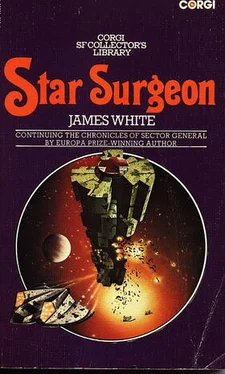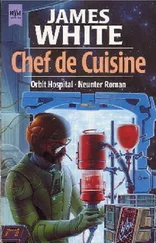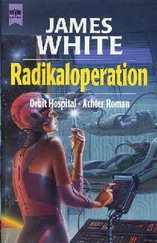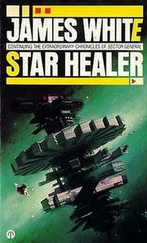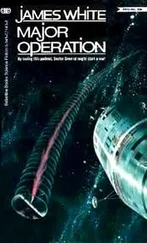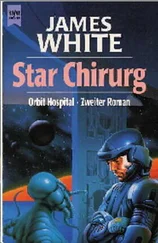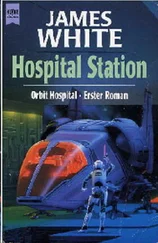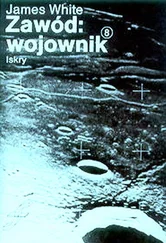Conway tried not to think of what it would be like at Sector General when the entire mobile force of the Empire was concentrated there …
A few hours before emergence they received another report from the agent who was now on the Empire’s Central World. The first one had taken nine days to reach Etla, the second was relayed with top priority coding in eighteen hours.
The report stated that the Central World did not seem to be as hostile toward extra-terrestrials as Etla and the other worlds of the Empire. The people there seemed much more cosmopolitan and occasionally e-ts could be seen in the streets. There were subtle indications, however, that beings had diplomatic status and were natives of worlds with which the Empire had made treaties with the purpose of holding them off as a group until such times as it could annex them individually. So far as the agent personally had been treated, things could not have been nicer, and in a few days time he was due for an audience with the Emperor himself. Nevertheless, he was beginning to feel uneasy.
It was nothing that he could put his finger on-he was a doctor who had been yanked off Survey and pre-Colonization duty, he reminded them, and not one of the Cultural Contact hot-shots. He got the impression that on certain occasions and among certain people, all mention of the Federation’s aims and constitution by himself was discouraged, while at other times, usually when there were only a few people present, they encouraged him to talk at great length. Another point which worried him was the fact that none of the newscasts he had seen made any mention of his arrival. Had the position been reversed and a citizen of the Empire made contact with the Federation, the event would have been top-line news for weeks.
He wondered sometimes if he was talking too much, and wished that a subspace receiver could be built as small as a sender so that he could ask for instructions.
That was the last they ever heard from that agent.
Conway’s return to Sector General was not as pleasant as he had thought it would be a few weeks previously. Then he had expected to return as a near-heroic personage with the biggest assignment of his career successfully accomplished, the plaudits of his colleagues ringing in his ears and with Murchison waiting to receive him with open arms. The latter had been a very slim probability indeed, but Conway liked to dream sometimes. Instead he was returning from a job which had blown up most horribly in his face, hoping that his colleagues would not stop him to ask how or what he had been doing, and with Murchison standing inside the lock with a friendly smile on her face and both arms hanging correctly by her sides.
Meeting him after a long absence, Conway thought sourly, was the sort of thing one friend did for another — there could be nothing more to it than that. She said it was nice to see him back and he said it was nice to be back, and when she started to ask questions he said he had a lot of things to do now but would it be all right if he called her later, and he smiled as if calling her to arrange a date was the most important thing in his mind. But his smile had suffered through lack of use and she must have seen that there was something definitely insincere about it. She went all Doctor-and-Nurse on him, said that of course he had more important things to attend to, and left quickly.
Murchison had looked as beautiful and desirable as ever and he had undoubtedly hurt her feelings, but somehow none of these things mattered to Conway at the moment. His mind would not think of anything but his impending meeting with O’Mara. And when he presented himself in the office of the Chief Psychologist shortly afterward it seemed that his worst forebodings were to be realized.
“Sit down, Doctor,” O’Mara began. “So you finally succeeded in involving us in an interstellar war …
“That isn’t funny,” said Conway.
O’Mara gave him a long, steady look. It was a look which not only noted the expression on Conway’s face but such other factors as his posture in the chair and the position and movements of his hands. O’Mara did not set much store by correct modes of address, but the fact that Conway had omitted to say “Sir” was also being noted as a contributory datum and given its proper place in his analysis of the situation. The process took perhaps two minutes and during that time the Chief Psychologist did not move an eyelid. O’Mara had no irritating mannerisms; his strong, blunt hands never twitched or fiddled with things, and when he desired it his features could be as expressive as a lump of rock.
On this occasion he let his face relax into an expression of almost benign disfavor, and finally he spoke.
“I agree,” he said quietly, “it isn’t a bit funny. But you know as well as I do that there is always the chance of some well-intentioned doctor in a place like this stirring up trouble on a large scale. We have often brought in some weird beastie of a hitherto unknown species who requires treatment urgently, and there is no time to search for its friends to discover if what we propose to do is the right procedure in the circumstances. A case in point was that Ian chrysalis you had a few months ago. That was before we made formal contact with the Ians, and if you hadn’t correctly diagnosed the patient’s condition as a growing chrysalis instead of a malignant growth requiring instant removal, a procedure which would have killed the patient, we would have been in serious trouble with the Ians.”
“Yes, sir,” said Conway.
O’Mara went on, “My remark was in the nature of a pleasantry, and had a certain aptness considering your recent experience with that Ian. Perhaps it was in questionable taste, but if you think I’m going to apologize then you obviously believe in miracles. Now tell me about Etla.
“And,” he added quickly before Conway could speak, “my desk and wastebasket are full of reports detailing the implications and probable dire consequences of the Etla business. What I want to know is how you handled your assignment as originally given.”
As briefly as possible Conway did as he was told. While he talked he felt himself begin to relax. He still had a confused and very frightening picture in the back of his mind of what the war would mean to countless millions of beings, to the hospital and to himself, but he no longer felt that he was partly responsible for bringing it about. O’Mara had begun the interview by accusing him of the very thing he had felt guilty of, then without saying so in so many words had made him see how ridiculous it had been to feel guilty. But as he neared the point where Lonvellin’s ship had been destroyed, the feeling returned full strength. If he had put the pieces together sooner, Lonvellin would not have died …
O’Mara must have detected the change of feeling, but allowed him to finish before he said, “It surprises me that Lonvellin didn’t see it before you did, it being the brain behind the operation. And while we’re on the subject of brains, yours does not seem to be thrown into complete disorder by problems involving large numbers of people requiring differing forms of treatment. So I have another job for you. It is smaller than the Etla assignment, you won’t have to leave the hospital, and with any luck it won’t blow up in your face.
“I want you to organize the evacuation of Sector General.”
Conway swallowed, then swallowed again.
“Stop looking as though you’d been sandbagged!” O’Mara said testily, “or I will hit you with something! You must have thought this thing through far enough to see that we can’t have patients here when the Empire force arrives. Or any non-military staff who have not volunteered to stay. Or any person, regardless of position or rank, who has in his mind detailed information regarding the whereabouts of any Federation planets. And surely the idea of telling people nominally your superiors what to do doesn’t frighten you, not after ordering a Corps Colonel around
Читать дальше
